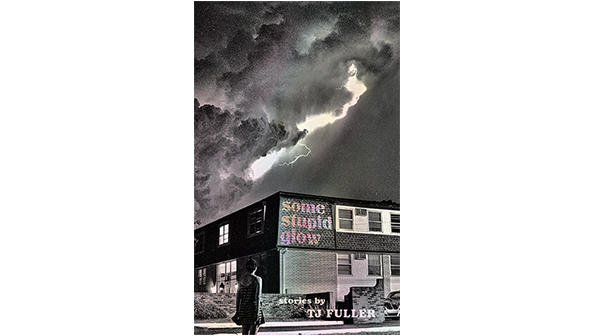“Dizzy Llamas” from the short-story collection SOME STUPID GLOW
Time loses the vertical hold. My seven-year-old, Emmy, will never know what that means—the way televisions used to skitter and the little knob that grabbed control—but she can see the house lost in time. The room has no idea what year it is. This is the house I grew up in, filling with Rogers, mes from every year I’ve been stuck in this town. I choke on a beer bong and finger paint the fireplace and steal my mother’s menthols and try to protect my daughter.
Eight-year-old me won’t stop lighting matches. Sixteen-year-old me cannot carry a tune. I try to hide the Rogers, but there are too many. Emmy glances between the older ones and me. She asks about their comic books and golf clubs. The other Rogers are not as annoyed. They show her squirt guns and magic tricks before they waver away.
I knew this house was glitchy, but when my wife left, I needed some place to batten down. The living room used to fill with forms of my mother, smoking and preaching and fighting. She taught me to settle the time. Straighten it. And as I got older, I rolled it on purpose, so I could see her high again, so I could see her cry at records, brush her hippie hair, giggle and chase the neighbor boys.
I cannot focus long enough to regain the room’s balance. Even though I know how, it’s no small feat to set it right. Emmy needs my attention. She has the attention of thirteen mes, and it is not enough. She shows all of us her stuffed sloth and handstand.
How will Emmy explain what happens here? Time opened too many tabs? Time had a media playback error? My mother called it the skips. This is your fault, she said to me. You were supposed to be the missing piece, the stability this house needed. I had expected the same, a distance from the old Rogers, something unfamiliar about their easy sweat and loud doubt. Emmy lets one swing her around, but he vanishes and she falls. Shit. I shouldn’t curse. I grab her ten-year-old Roger’s candy. “Hey,” he calls and disappears.
The hold is loose long enough that other versions of Emmy start to blip in and out. With her thick wail and darling wobble. With fat black eyes and penciled toes. Sleepless me arrives. He cannot burp his daughter because he is afraid of killing her. He stares into her mewl and feels her funeral. I know. I can still feel it. I wonder if I let us keep slipping if I would get to see preteen Emmy, smoking Emmy—her with a beer in her hand and a boy on her phone.
“Look!” I call to sleepless me and point to today’s Emmy. “She makes it this far.” But I am in the anchor moment. The Rogers rolling in and out don’t remember where they’ve been. I am the one who has to hold on to this. To let it matter to the Rogers to come.
Rogers ahead of me wend across the room. Blinkered, pocked, they aim for the couch. I try to slow the room down, change direction. I don’t need to see what never changes. Is that Emmy unpacking in this same house? God forbid. She’d bring back feathered hair and bad records and big tears.
Seven-year-old Emmy trips and starts to cry. “Honey, honey,” I call. “Let’s play dizzy llamas.” We spin, lose our focus, don’t have to see anything—that’s the point of the game. She is free to blur, but I have to keep an eye out—that too is the point of the game, me the first to the floor to break her fall. She revs up, and I wait for the reeling to be too much.
Other books you might enjoy




